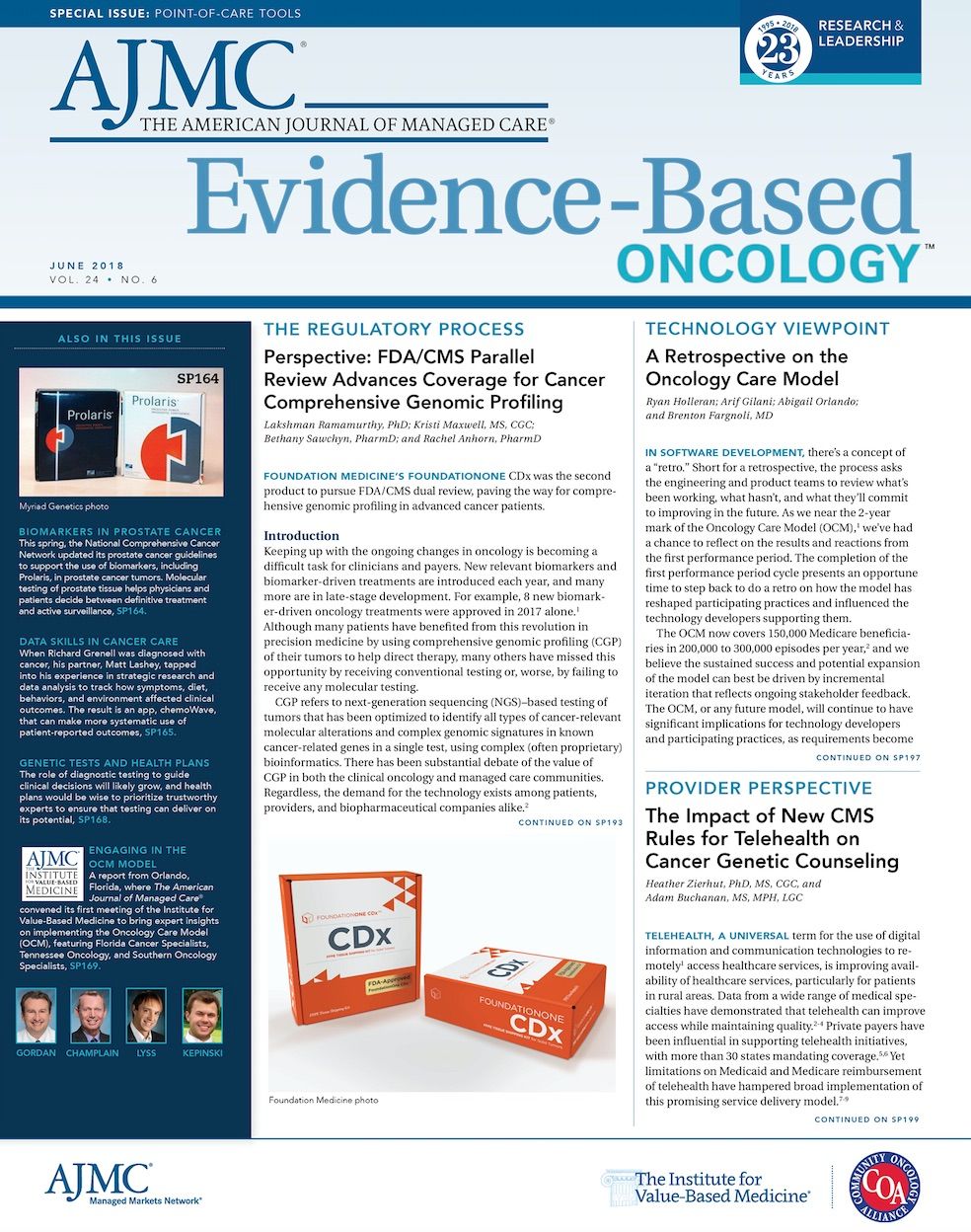- Center on Health Equity & Access
- Clinical
- Health Care Cost
- Health Care Delivery
- Insurance
- Policy
- Technology
- Value-Based Care
From the Editor in Chief: Making Disruptive Technology Less Disruptive
Film is truth 24 times a second, and every cut is a lie – Jean-Luc Godard
While Godard's pronouncement on the cinema may have been uttered with more than a hint of irony, the sensibilities he captured do have relevance in regard to the delivery of cancer care. When patients discuss what
is of the greatest value in their care, many describe their relationship with their physician as an essential, indispensable part of their cancer journey. Similarly, most physicians describe their relationship with their patients as the grounding core of their profession. As the “truth” of these key human interactions are disrupted by the technical and workflow disruptions that, tragically, increasingly permeate and undermine the quality of the time spent in direct patient care, both physicians and patients note the toll that these disruptions take their experience of healthcare.
As cancer care becomes increasingly technology driven, the relationship between the patient and the physician is increasingly subject to “cuts” that undermine the patient centricity of care. In addition, as the increasing number of “cuts” become an inescapable part of the oncologist’s work day (including the innumerable clicks necessary to navigate electronic health records, the interruptions of having to obtain authorization for diagnostic studies, the paperwork associated with obtaining access to cutting edge oral therapeutics, interpreting genomic testing data, seeking clinical trials for patients), the complexity and work burdens of physicians are leading to greater clinician work stress and burnout. Inasmuch as advances in diagnostic technologies, such as genomic testing, promise to improve patient outcomes, the addition of reviewing, interpreting the results, developing care plans based upon genomic data further test the time limits and technical skills of many oncologists. In an article in Healthcare Informatics, the authors quote Jeremy Warner, MD, MS, in noting:
Integrating genomics into clinical workflow is a step into unknown territory, he added. Health systems have to make sure the report is not interruptive of the patient- doctor relationship. “I can’t imagine reading a 30-page PDF in front of a patient in the office.”1
The importance of bringing effective point-of-care tools to the practice of oncology cannot be overstated. With the confluence of the increasing complexity of delivering state-of-the-art cancer care to patients and the finite limits of physician time, focus, and human sustainability, the importance of more effective point-of-care resources seems to be self-evident. Advances in information technologies, coupled with greater engagement of an increasingly diverse set of health care stakeholders, has helped to grow point-of-care tools from a core suite of technologies that include evidence-based guidelines and clinical pathways tools to a growing breadth of assets that bring genomic information, reimbursement support, and patient education tools closer toward meeting the needs of the patient and the clinician. These tools may take the form of more effective authorization policies by private and government payers, telehealth support to ensure more effective patient engagement and education, and apps to assess patient-reported outcomes.
In this month’s edition of Evidence-Based OncologyTM, we review some of the point-of-care tools that may help to improve physician work life while also enhancing the patients’ care experience. Authors from Flatiron Health share offer an update on what is working and what’s not with the Oncology Care Model from the perspective of the technology provider and how changes could mitigate the burdens of the electron health record upon physicians’ time with their patients. Authors from Foundation Medicine describe how changes to the FDA/CMS approval process can reduce the pre-authorization burden imposed upon physicians seeking genomic testing for their cancer patients. Matt Lashey from chemoWave writes about how an app to track patient-reported outcomes can help empower better care. Heather Zierhut, PhD, MS, CGC, and Adam Buchanan, MS, MPH, LGC, explore how Medicare reimbursement for telehealth for genetic counseling could more effectively meet patient care needs while helping physicians bring additional expertise to the care of their patients.
Reference:
- Raths D. The ongoing struggle to get actionable genomic data to the point of dare. HealthCare Informatics website. healthcare-informatics.com/blogs/ david-raths/ongoing-struggle-get-actionable-genomic-data-point-care. Published October 26, 2016. Accessed May 8, 2018.

Empowering Children and Parents Through Technology: Opportunities, Challenges, and Future Directions
January 15th 2026Digital health platforms improve pediatric care by offering customized, interactive tools for children and parents. They enhance education, support, and engagement while tackling challenges related to access, usability, and privacy.
Read More
Exploring Racial, Ethnic Disparities in Cancer Care Prior Authorization Decisions
October 24th 2024On this episode of Managed Care Cast, we're talking with the author of a study published in the October 2024 issue of The American Journal of Managed Care® that explored prior authorization decisions in cancer care by race and ethnicity for commercially insured patients.
Listen
Subjective and Objective Impacts of Ambulatory AI Scribes
January 8th 2026Although the vast majority of physicians using an artificial intelligence (AI) scribe perceived a reduction in documentation time, those with the most actual time savings had higher relative baseline levels of documentation time.
Read More

